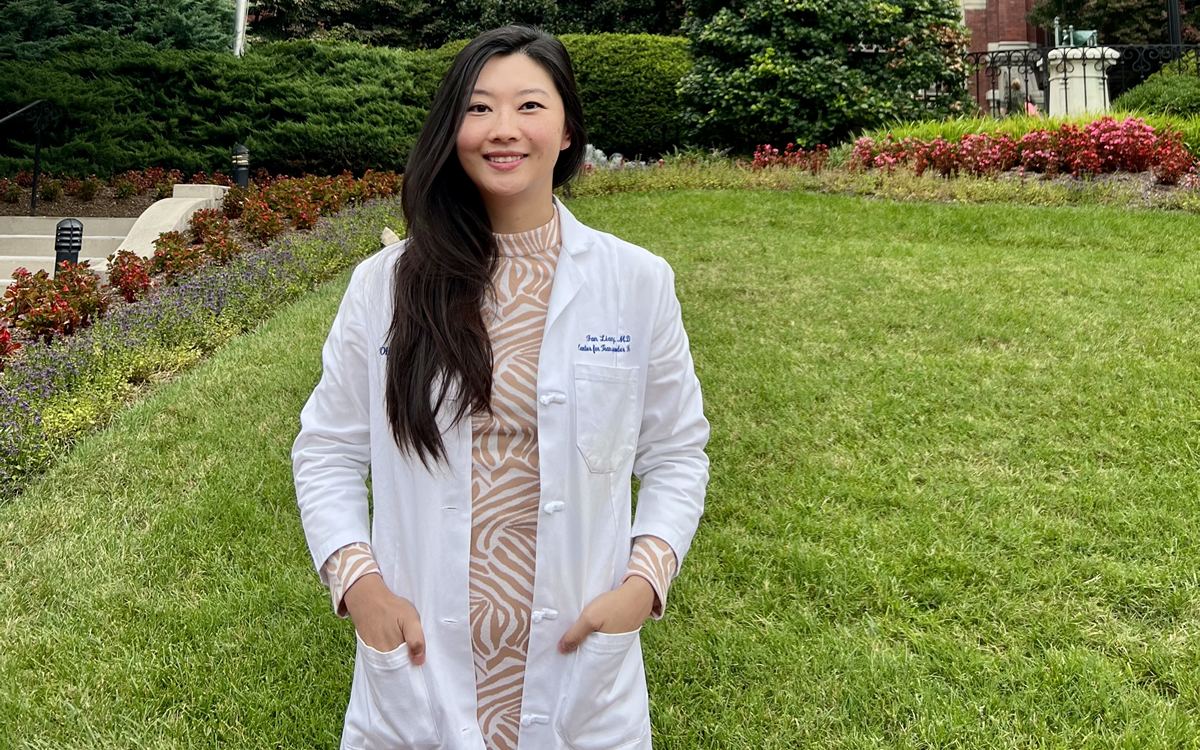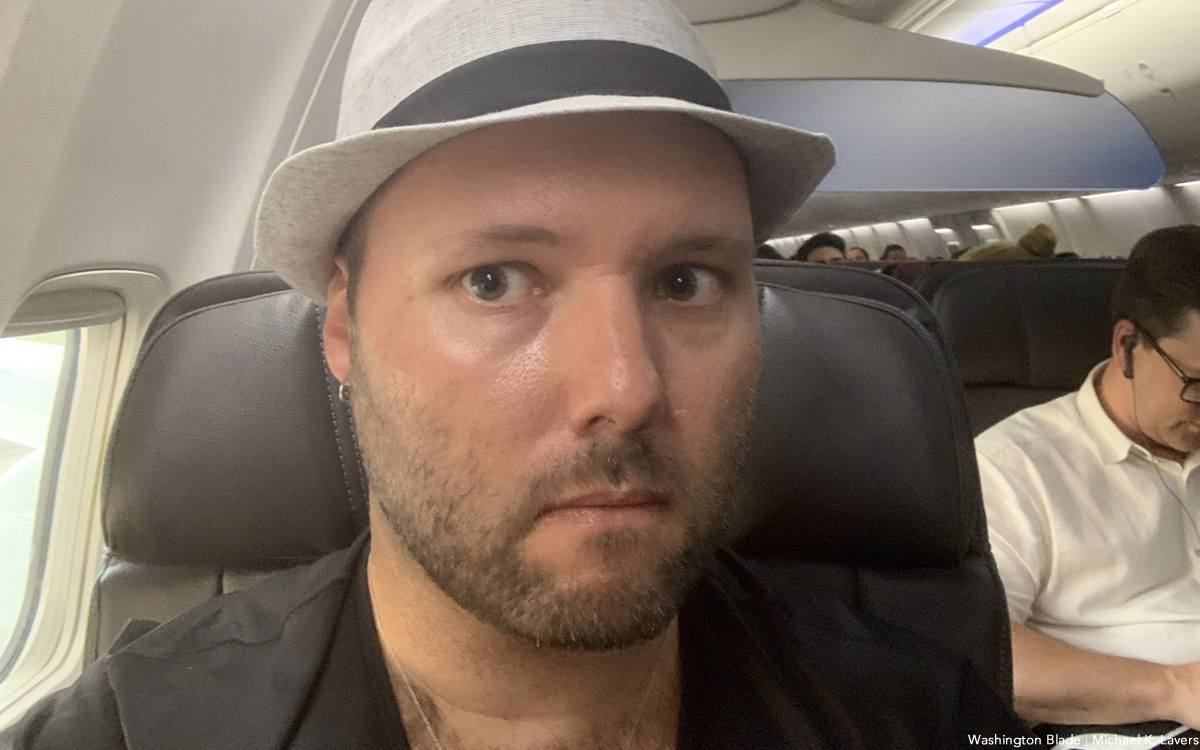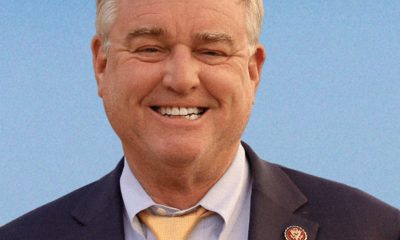Health
EXCLUSIVE: Meet the director of Johns Hopkins Center for Transgender Health
Dr. Fan Liang on politicizing healthcare, fear among patients

The topic of gender affirming healthcare has never attracted more attention or scrutiny, presenting challenges for both patients and providers, including Dr. Fan Liang, medical director of the Johns Hopkins Center for Transgender and Gender Expansive Health and assistant professor of plastic and reconstructive surgery.
Speaking with the Washington Blade by phone last week, Liang shared her perspective on a variety of topics, including her concerns about the ways in which media organizations and others have shaped the discourse about gender affirming care.
Too often, she said, the public is provided incomplete or inaccurate information, framed with politically charged and polarizing language rather than balanced and nuanced reporting for the benefit of audiences who might have little to no familiarity with the topics at hand.
“This is an evolving field that requires input from many different types of specialists,” Liang noted, so one issue comes when providers “start to comment outside of their scope of practice, or extrapolate into everybody’s experience.”
A more intractable and difficult problem, Liang said, is presented by the fact that, “issues with transgender health have really taken center stage with regard to national politics, and as a result of that, the narrative has really been reduced to an unsophisticated representation of what’s going on.”
“I think that is dangerous for patients and for the community that these patients live in and have to work in and survive in because it paints a picture that is really inaccurate,” she said.
Conservative state legislatures across the country have introduced a record number of anti-LGBTQ bills this year, passing dozens, including a slew of anti-trans healthcare restrictions. The Human Rights Campaign reports 35.1 percent of transgender youth now live in states that have passed bans on gender affirming care, many of which carry criminal penalties for providers.
A big part of the Center’s work, Liang told the Blade, involves working closely with trans patients and organizations like Trans Maryland and the Trans Rights Advocacy Coalition “to make sure that the community’s voices are being heard, so that we’re able to represent those interests here.”
She described “a generalized sense of anxiety and fear,” concerns that she said are “pervasive throughout the community,” over “access to surgery and to overall gender healthcare.”
“I get a lot of questions about that,” she said.
While Liang has not yet worked with any patients who traveled to the Center because gender affirming care was banned in the states where they reside, she said, “I do anticipate that will happen in the relatively near future.”
Challenges for clinicians
The political climate “really interferes in physician autonomy and basically using our training and discretion to provide the best therapies that we can,” based on research and evidence-based guidelines from medical organizations on best practices standards of care, Liang said.
“I earnestly believe that people who go into medicine try to do right by their patients and try to provide exceptional care whenever they can,” she said. “When I speak to other providers who are engaged in trans care, the reason they entered the field was because they saw patients that were suffering and had no other providers to go to and they were filling a need that desperately needed to be filled.”
“It is unfortunate that their motives are being misinterpreted, because it is causing significant emotional harm to these providers who are being targeted,” Liang said, noting “there is so much vitriol from the anti-trans side of things,” including “this narrative out there that physicians are providing trans care because of financial reasons or because of some sort of politically motivated, I don’t know, conspiracy.”
The political climate, along with the realities of practicing in this speciality, may threaten to stem the pipeline of new providers whose practice would otherwise include gender affirming care, said Liang, who serves on the interview board for incoming residents who are looking to specialize in plastic surgery.
Many, perhaps even most, she said, are eager to explore transgender care, often because, particularly among young trainees, they are friends with trans and non-binary people. “I don’t know how much of that interest persists as they move through the training pipeline, because — especially if they are at an institution that does provide trans care — they do see a lot of the struggles that physicians encounter in being able to offer these services.”
Liang noted the “significant hurdles from an insurance standpoint” and the “significant prerequisites in order to access surgery,” which require “a tremendous amount of back-end coordination and optimization of the logistics for surgical readiness.”
“And then,” she said, “they see a lot of the backlash in the media against trans providers, and I think that that does discourage residents who otherwise would be interested in the field because physicians, by and large, are a pretty conservative bunch. And having them start their practice where they’re sort of stepping into a political minefield is not ideal.”
Speaking up can be beneficial but risky
“Some physicians feel like they can make the most amount of impact by being advocates for the patient population on a national stage or being more vocal about how anti-trans legislation has been impacting their patients,” Liang said.
“My goal, as the director for the Center for Transgender Health here at Hopkins is really to normalize this care to allow for the open conversation and discussion amongst providers to create a safe space for people to feel comfortable providing this care,” she said.
Destigmatizing gender affirming care and connecting clinicians who practice in this space will help these providers understand they are not “functioning in isolation” and instead are part of “a national effort and a nationally concerted effort toward delivering state-of-the-art health care,” Liang said.
“It’s important,” she said, to “bring the generalized healthcare community to the table in offering these services and have a frank discussion when it comes to education, research and teaching.”
Other providers, however, “do not feel comfortable putting themselves into that place of vulnerability,” Liang said, “and I don’t fault them for it because I personally know people who’ve received death threats and who have been targeted because of what they say to the media,” in many cases because their comments were reported incorrectly or out of context.
In July, Liang participated in an emergency trans rights roundtable on Capitol Hill with representatives from advocacy groups like the Southern Poverty Law Center and the Transgender Law Center, as well as members of Congress including U.S. Reps. Mark Takano (D-Calif.), Barbara Lee (D-Calif.), and Sara Jacobs (D-Calif.).
She told the Blade it was “a really wonderful experience” to “hear the heartfelt stories” of the panelists advocating on behalf of themselves, their friends, and their families, earning the attention of members of Congress.
“I do think advocacy is important,” Liang told the Blade. “I try to make time for it when I can,” she said, “but I have to balance that with all of my other clinical obligations.”
Finding compassion and lowering the temperature
On Aug. 1, The Baltimore Banner reported that the director of the Mayor’s Office of LGBTQ Affairs in Baltimore filed a discrimination complaint with the city’s Office of Equity and Civil Rights against the Hopkins Center for Transgender and Gender Expansive Health. (The story was also published by the Washington Blade, which has a media partnership with the Banner.)
Asked for comment, Liang said “it was an upsetting article to read,” adding, “I was upset that there wasn’t more due diligence done to investigate a little bit further” because instead the article presents “just this one person’s account of things.”
She noted there is “not much I can say from a physician standpoint because everything is contained within HIPAA,” the federal Health Insurance Portability and Accountability Act, which prohibits providers from even acknowledging which patients they may or may not have worked with.
The Banner article underscores the importance of journalists’ obligations to “make sure there is due diligence to confirm sources and make sure things are accurate,” Liang said, including, of course, when covering complicated and politically fraught subjects like gender affirming care.
“On the one hand, it’s really wonderful that there’s a fair amount of press being dedicated to trans issues around the country,” Liang said, but what is “frustrating for me is these conversations always seem to be so loaded and politically charged, and there doesn’t seem to be much space for people to ask earnest and honest questions” without taking heat from either side.
There is “compassion to be offered for patients who are struggling to receive basic health care” as well as for “people who are struggling to understand how this issue is evolving,” those for whom the matter is “uncharted territory” and therefore likely to “cause consternation and fear,” she said.
“Most of the time, the way to overcome” this is to cultivate “relationships with people who do identify as transgender or non-binary” on the grassroots level, she said, while leaving room “for people to ask earnest and honest questions.”
Removing the artificial “us-versus-them” paradigm provides “opportunity for more compassionate interactions,” Liang said.
At the same time, she conceded, amid the heightened polarization and escalation of an anti-trans backlash over the last few years, efforts to fight sensationalization with compassion and understanding have often fallen short, presenting hurdles that have long plagued other areas of science and medicine like abortions and vaccines.
Commentary
Journalists are not the enemy
Wednesday marks five years since Blade reporter detained in Cuba

Wednesday marked five years since the Cuban government detained me at Havana’s José Marti International Airport.
I had tried to enter the country in order to continue the Washington Blade’s coverage of LGBTQ and intersex Cubans. I found myself instead unable to leave the customs hall until an airport employee escorted me onto an American Airlines flight back to Miami.
This unfortunate encounter with the Cuban regime made national news. The State Department also noted it in its 2020 human rights report.
Press freedom and a journalist’s ability to do their job without persecution have always been important to me. They became even more personal to me on May 8, 2019, when the Cuban government for whatever reason decided not to allow me into the country.

‘A free press matters now more than ever’
Journalists in the U.S. and around the world on May 3 marked World Press Freedom Day.
Reporters without Borders in its 2024 World Press Freedom Index notes that in Cuba “arrests, arbitrary detentions, threats of imprisonment, persecution and harassment, illegal raids on homes, confiscation, and destruction of equipment — all this awaits journalists who do not toe the Cuban Communist Party line.”
“The authorities also control foreign journalists’ coverage by granting accreditation selectively, and by expelling those considered ‘too negative’ about the government,” adds Reporters without Borders.
Cuba is certainly not the only country in which journalists face persecution or even death while doing their jobs.
• Reporters without Borders notes “more than 100 Palestinian reporters have been killed by the Israel Defense Forces, including at least 22 in the course of their work” in the Gaza Strip since Hamas launched its surprise attack against Israel on Oct. 7, 2023. Media groups have also criticized the Israeli government’s decision earlier this month to close Al Jazeera’s offices in the country.
• Wall Street Journal reporter Evan Gershkovich, Washington Post contributor and Russian opposition figure Vladimir Kara-Murza and Radio Free Europe/Radio Liberty’s Alsu Kurmasheva remain in Russian custody. Austin Tice, a freelance journalist who contributes to the Post, was kidnapped in Syria in August 2012.
• Reporters without Borders indicates nearly 150 journalists have been murdered in Mexico since 2000, and 28 others have disappeared.

Secretary of State Antony Blinken in his World Press Freedom Day notes more journalists were killed in 2023 “than in any year in recent memory.”
“Authoritarian governments and non-state actors continue to use disinformation and propaganda to undermine social discourse and impede journalists’ efforts to inform the public, hold governments accountable, and bring the truth to light,” he said. “Governments that fear truthful reporting have proved willing to target individual journalists, including through the misuse of commercial spyware and other surveillance technologies.”
U.S. Agency for International Development Administrator Samantha Power, who is a former journalist, in her World Press Freedom Day statement noted journalists “are more essential than ever to safeguarding democratic values.”
“From those employed by international media organizations to those working for local newspapers, courageous journalists all over the world help shine a light on corruption, encourage civic engagement, and hold governments accountable,” she said.
President Joe Biden echoed these points when he spoke at the White House Correspondents’ Association Dinner here in D.C. on April. 27.
“There are some who call you the ‘enemy of the people,'” he said. “That’s wrong, and it’s dangerous. You literally risk your lives doing your job.”
I wrote in last year’s World Press Freedom Day op-ed that the “rhetoric — ‘fake news’ and journalists are the ‘enemy of the people’ — that the previous president and his followers continue to use in order to advance an agenda based on transphobia, homophobia, misogyny, islamophobia, and white supremacy has placed American journalists at increased risk.” I also wrote the “current reality in which we media professionals are working should not be the case in a country that has enshrined a free press in its constitution.”
“A free press matters now more than ever,” I concluded.
That sentiment is even more important today.
Health
MISTR announces it’s now prescribing DoxyPE

MISTR, the telemedicine provider that offers free online PrEP and long-term HIV care in all 50 states, D.C., and Puerto Rico, announced it is now prescribing Doxycycline Post-Exposure Prophylaxis (DoxyPEP), an antibiotic that reduces bacterial STIs, including gonorrhea, chlamydia, and syphilis. Patients can now use MISTR’s telehealth platform to receive DoxyPEP online for free, according to a release from the company.
With this launch, MISTR plans to offer patients access to post-exposure care, in addition to its existing preventive and long-term HIV treatment options, which include PrEP and antiretroviral therapy (ART). This comes at a time when the rate of STIs continue to rise. In 2022, more than 2.5 million cases of syphilis, gonorrhea, and chlamydia were reported in the U.S; of that population, gay and bisexual men are disproportionately affected, the company reported.
“Despite an ongoing STI epidemic affecting the LGBTQ+ community, there are few resources available for this underserved, vulnerable community to get the preventative medication they need,” said Tristan Schukraft, CEO and founder of MISTR. “I’m proud that MISTR is democratizing access to PrEP, HIV care, and now DoxyPEP.”
An NIH-funded study published by the New England Journal of Medicine in April 2023 found that doxycycline as post-exposure prophylaxis, now known as DoxyPEP, reduced syphilis by 87%, chlamydia by 88%, and gonorrhea by 55% in individuals taking HIV PrEP, and reduced syphilis by 77%, chlamydia by 74% and gonorrhea by 57% in people living with HIV.
MISTR is a telemedicine platform offering free online access to pre-exposure prophylaxis (PrEP) and long-term HIV care Visit mistr.com for more information.
Health
UNAIDS to commemorate Zero Discrimination Day’s 10th anniversary
UN agency urges global action to protect human rights

As the world marks the 10th anniversary of Zero Discrimination Day; UNAIDS is sounding the alarm on the increasing threats to human rights, calling for renewed efforts to protect the rights of all individuals as a fundamental step towards ensuring health for everyone.
Established by UNAIDS a decade ago, Zero Discrimination Day aims to promote equality and fairness regardless of gender, age, sexuality, ethnicity or HIV status. The progress achieved over the past years is now in jeopardy, however, due to rising attacks on the rights of women, LGBTQ people and other marginalized communities.
UNAIDS Executive Director Winnie Byanyima emphasized the critical link between protecting human rights and safeguarding public health.
“The attacks on rights are a threat to freedom and democracy and are harmful to health,” she said in a press release. “Stigma and discrimination obstruct HIV prevention, testing, treatment and care and hold back progress towards ending AIDS by 2030. It is only by protecting everyone’s rights that we can protect everyone’s health.”
Despite challenges, there has been notable progress.
At the onset of the AIDS pandemic more than 40 years ago, two-thirds of countries criminalized consensual same-sex sexual relations. They are now decriminalized in two-thirds of countries. An additional 38 countries around the world have pledged to end HIV-related stigma and discrimination, contributing to positive changes that include 50 million more girls attending school compared to 2015.
To sustain and enhance these advancements; UNAIDS urges global support for women’s rights movements, LGBTQ rights, racial justice, economic justice, climate justice and peace initiatives. By standing with communities advocating for their rights, the U.N. aims to reinforce the collective effort towards a more inclusive and equitable world.
Zero Discrimination Day is observed on March 1.
Events and activities that will take place around the world throughout the month will serve as reminders of the essential lesson and call to action: Protecting everyone’s health is synonymous with protecting everyone’s rights.
“Through upholding rights for all, we will be able to achieve the Sustainable Development Goals and secure a safer, fairer, kinder and happier world — for everyone,” said Byanyima.




















